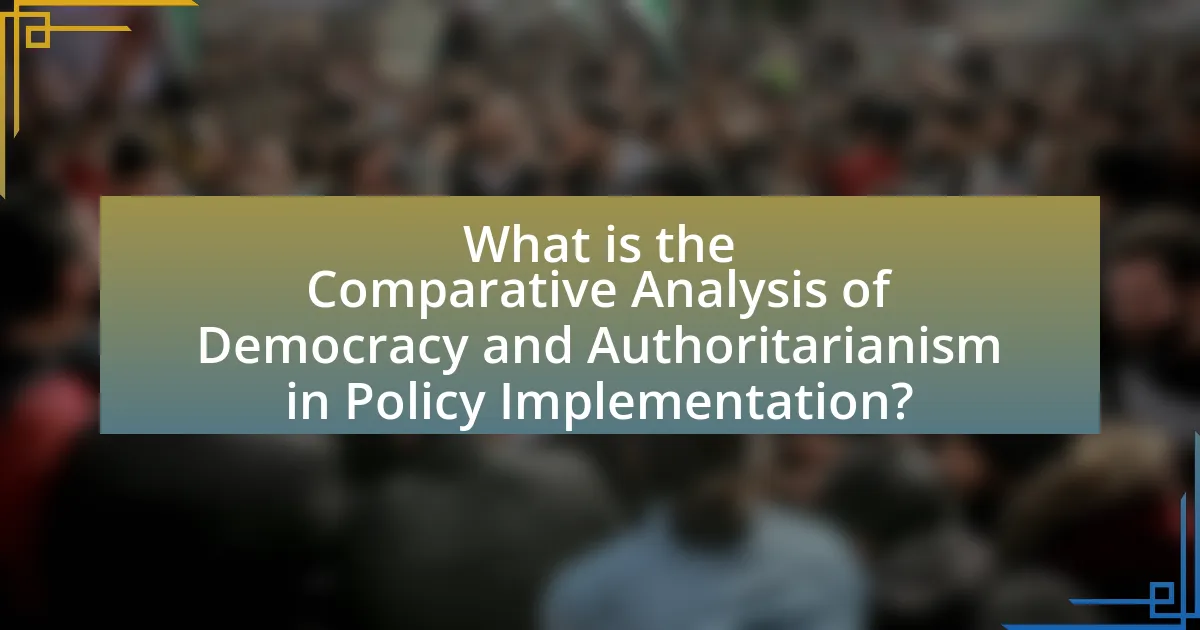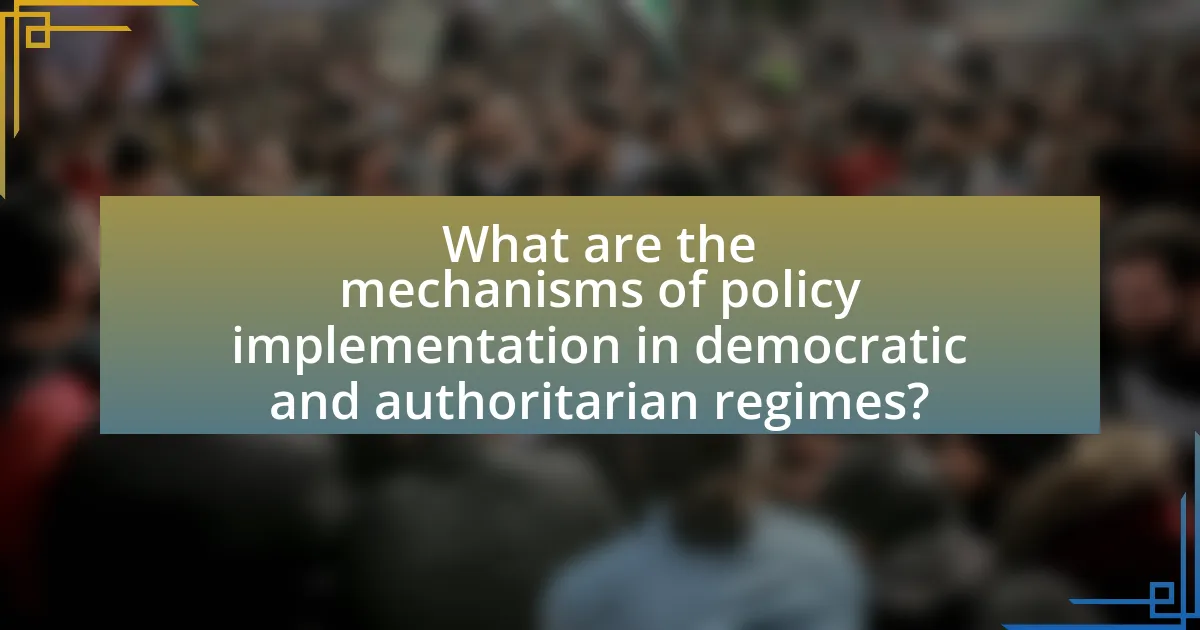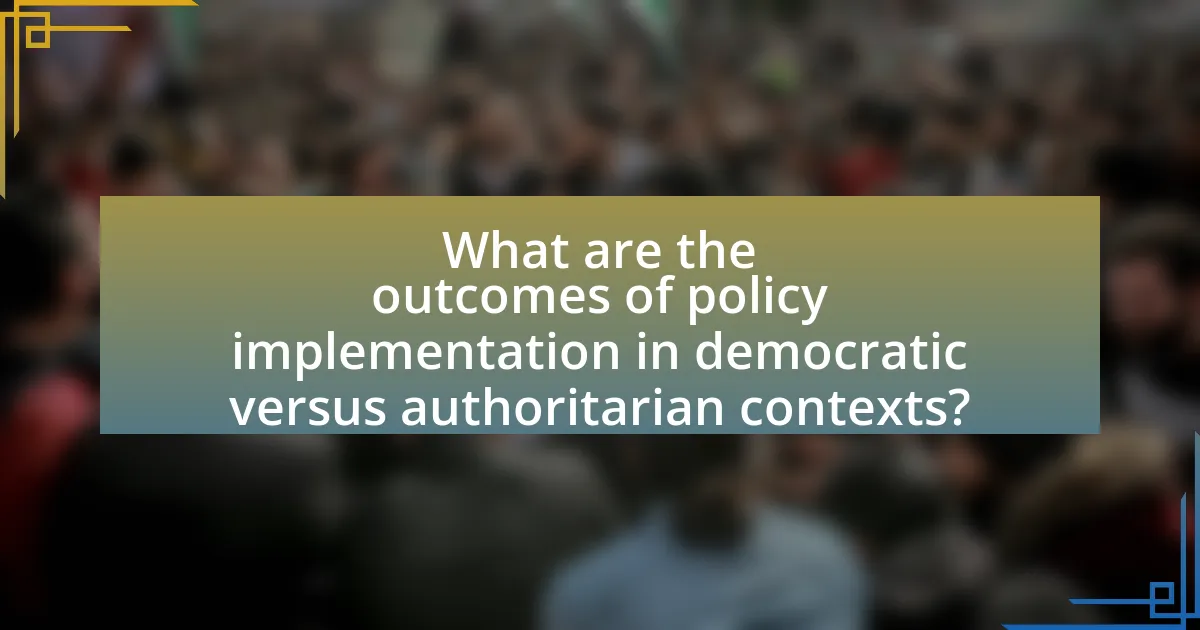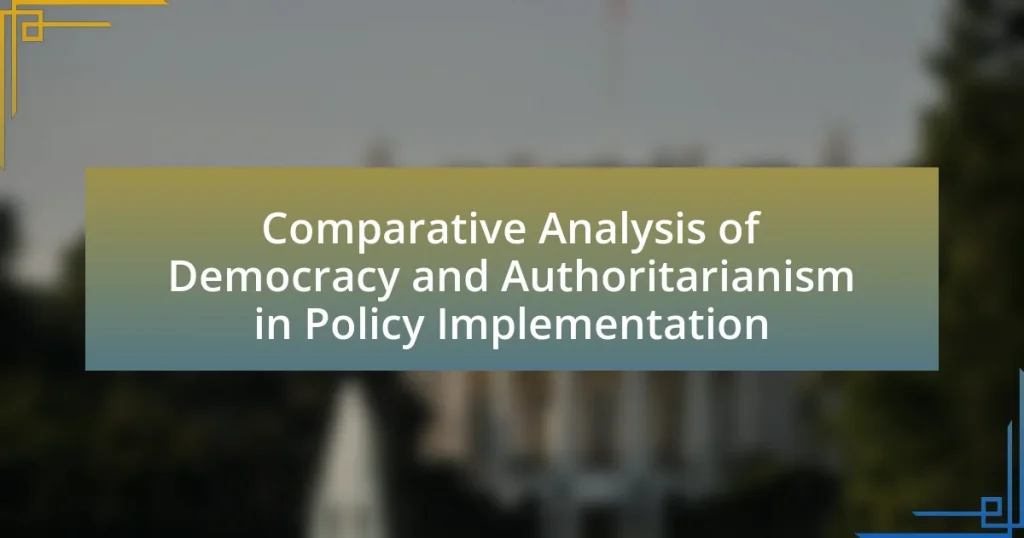The article provides a comparative analysis of democracy and authoritarianism in policy implementation, highlighting the fundamental differences in their approaches. Democracies prioritize public participation, accountability, and transparency, leading to policies that reflect diverse interests and enhance citizen welfare. In contrast, authoritarian regimes focus on centralized control and efficiency, allowing for rapid policy execution but often at the expense of human rights and public dissent. The article examines key characteristics of both governance systems, their mechanisms of policy implementation, and the implications for social welfare, economic development, and public trust, ultimately identifying best practices that can improve policy effectiveness across different political contexts.

What is the Comparative Analysis of Democracy and Authoritarianism in Policy Implementation?
The comparative analysis of democracy and authoritarianism in policy implementation reveals that democracies typically prioritize public participation and accountability, while authoritarian regimes focus on centralized control and efficiency. In democracies, policy implementation often involves extensive consultation with stakeholders, leading to policies that reflect diverse interests, as seen in countries like Sweden, where public input shapes social welfare policies. Conversely, authoritarian regimes, such as China, can implement policies rapidly without public debate, allowing for swift responses to crises, exemplified by their rapid infrastructure development. However, this efficiency can come at the cost of human rights and public dissent, as seen in the suppression of protests in authoritarian states. Thus, the effectiveness of policy implementation varies significantly between these two governance systems, influenced by their foundational principles and societal engagement.
How do democracy and authoritarianism differ in their approach to policy implementation?
Democracy and authoritarianism differ significantly in their approach to policy implementation, with democracies emphasizing public participation and accountability, while authoritarian regimes prioritize centralized control and limited public input. In democracies, policies are typically developed through a process that involves consultation with citizens, stakeholders, and elected representatives, ensuring that diverse viewpoints are considered. For example, in the United States, public hearings and legislative debates are integral to shaping policy, reflecting the democratic principle of representation. In contrast, authoritarian regimes often implement policies unilaterally, with decisions made by a small group of leaders or a single authority, as seen in countries like North Korea, where the government enforces policies without public consultation or dissent. This fundamental difference in approach affects not only the legitimacy of the policies but also their effectiveness and public acceptance.
What are the key characteristics of democratic policy implementation?
The key characteristics of democratic policy implementation include transparency, accountability, participation, and adherence to the rule of law. Transparency ensures that the processes and decisions are open to public scrutiny, allowing citizens to understand how policies are formed and executed. Accountability involves mechanisms that hold policymakers responsible for their actions, ensuring that they answer to the public and other governing bodies. Participation emphasizes the involvement of various stakeholders, including citizens and civil society, in the policy-making process, fostering inclusivity and representation. Lastly, adherence to the rule of law guarantees that policies are implemented within a legal framework, protecting individual rights and maintaining order. These characteristics are essential for fostering trust and legitimacy in democratic governance.
What are the defining features of authoritarian policy implementation?
Authoritarian policy implementation is characterized by centralized decision-making, limited public participation, and the use of coercive measures to enforce compliance. Centralized decision-making occurs as a small group of leaders or a single authority dictates policies without significant input from the populace, contrasting with democratic systems that encourage broader participation. Limited public participation is evident as citizens have restricted avenues to influence policy, often leading to a lack of accountability. Coercive measures, such as surveillance, censorship, and repression of dissent, are frequently employed to maintain control and ensure adherence to policies, as seen in regimes like North Korea and China, where dissent is systematically suppressed to uphold the ruling authority’s agenda.
Why is it important to compare democracy and authoritarianism in policy implementation?
Comparing democracy and authoritarianism in policy implementation is important because it reveals how governance structures influence policy outcomes and citizen welfare. Democracies typically prioritize transparency, accountability, and public participation, which can lead to more effective and equitable policies, as evidenced by the World Bank’s findings that democratic nations often experience higher levels of economic growth and social development. In contrast, authoritarian regimes may implement policies more swiftly but often lack public input and can lead to human rights abuses, as seen in countries like North Korea, where policy decisions are made without citizen engagement. This comparison helps identify best practices and potential pitfalls in governance, ultimately guiding efforts to improve policy effectiveness across different political systems.
How does this comparison impact governance and public trust?
The comparison between democracy and authoritarianism significantly impacts governance and public trust by influencing the transparency and accountability of political systems. In democratic regimes, policies are typically implemented through participatory processes that foster public engagement, leading to higher levels of trust among citizens; for instance, studies show that countries with democratic governance, such as Sweden, report over 80% public trust in government institutions. Conversely, authoritarian regimes often prioritize control over citizen involvement, resulting in lower public trust due to perceived corruption and lack of accountability, as evidenced by the low trust levels in countries like North Korea, where public trust in government is near zero. This disparity in governance styles directly affects how citizens perceive their leaders and institutions, shaping overall societal stability and cooperation.
What lessons can be learned from analyzing these two systems?
Analyzing democracy and authoritarianism reveals that democratic systems tend to promote greater public participation and accountability, while authoritarian systems often prioritize efficiency and control. Democratic governance encourages diverse stakeholder engagement, leading to policies that reflect a broader range of interests, as evidenced by the higher voter turnout and civic engagement in democratic nations compared to authoritarian regimes. Conversely, authoritarian systems can implement policies more swiftly due to centralized decision-making, which can be beneficial in crisis situations, as seen in countries that rapidly mobilized resources during emergencies. This comparative analysis highlights the trade-offs between inclusivity and efficiency in policy implementation across different governance structures.

What are the mechanisms of policy implementation in democratic and authoritarian regimes?
The mechanisms of policy implementation in democratic regimes typically involve a multi-step process that includes public participation, legislative approval, and accountability through checks and balances. In contrast, authoritarian regimes often implement policies through top-down directives, limited public input, and centralized control, which can lead to rapid execution but may lack transparency and accountability. For example, in democracies like the United States, policies are debated in Congress and require public input, while in authoritarian states like China, the Communist Party can swiftly enact policies without public consultation, as seen in the rapid implementation of economic reforms. This distinction highlights how the structure of governance directly influences the effectiveness and legitimacy of policy implementation.
How do political institutions influence policy implementation in democracies?
Political institutions significantly influence policy implementation in democracies by establishing the frameworks within which policies are developed, debated, and executed. These institutions, including legislatures, executives, and judiciaries, create rules and norms that shape the behavior of political actors and the interactions among them. For instance, the presence of a strong legislative body can enhance accountability and transparency in policy implementation, as seen in countries like Sweden, where parliamentary oversight ensures that government actions align with public interests. Additionally, the independence of the judiciary in democracies, such as in Canada, allows for the enforcement of laws and protection of rights, which further impacts how policies are executed. Thus, the structure and strength of political institutions directly affect the effectiveness and efficiency of policy implementation in democratic contexts.
What role do elections play in shaping policy outcomes?
Elections play a crucial role in shaping policy outcomes by determining which political parties or candidates gain power and influence over governance. The electoral process allows citizens to express their preferences, leading to the selection of representatives who align with their policy priorities. For instance, in democratic systems, elected officials are accountable to voters, which incentivizes them to implement policies that reflect the electorate’s demands. Research shows that countries with competitive elections tend to have more responsive and adaptive policy frameworks, as seen in the United States, where shifts in congressional control often lead to significant changes in legislation, such as healthcare reforms or tax policies. Thus, elections serve as a mechanism for public input and accountability, directly impacting the direction and nature of policy decisions.
How does public participation affect policy implementation in democracies?
Public participation significantly enhances policy implementation in democracies by fostering transparency, accountability, and responsiveness. When citizens engage in the policymaking process, they provide valuable insights and feedback that can lead to more effective and relevant policies. For instance, studies have shown that public consultations can improve policy outcomes by aligning them with the needs and preferences of the community, as evidenced by the 2015 Paris Agreement, where extensive public engagement helped shape climate policies. Furthermore, increased public involvement often leads to greater trust in government institutions, which is crucial for successful policy execution. Research indicates that democracies with higher levels of public participation tend to experience more successful implementation of policies, as seen in various case studies across Europe and North America.
What mechanisms are used in authoritarian regimes for policy implementation?
Authoritarian regimes implement policies through mechanisms such as centralized decision-making, coercive enforcement, and propaganda. Centralized decision-making allows a small group of leaders to dictate policies without public input, ensuring swift implementation. Coercive enforcement involves the use of state security forces to suppress dissent and ensure compliance with policies, as seen in regimes like North Korea and Syria. Propaganda is utilized to shape public perception and justify government actions, often through state-controlled media, which reinforces the legitimacy of the regime’s policies. These mechanisms collectively enable authoritarian governments to maintain control and effectively implement their agendas.
How do state control and censorship impact policy effectiveness?
State control and censorship significantly hinder policy effectiveness by limiting information flow and suppressing dissent. In authoritarian regimes, where state control is prevalent, policies often lack transparency and public engagement, leading to misalignment with citizens’ needs. For instance, the Chinese government’s censorship of media restricts public discourse, resulting in policies that may not reflect the population’s actual concerns, as evidenced by the 2019 protests in Hong Kong against perceived government overreach. This disconnect can lead to ineffective policy implementation and social unrest, demonstrating that state control and censorship can undermine the legitimacy and success of governmental initiatives.
What role does propaganda play in shaping public perception of policies?
Propaganda plays a crucial role in shaping public perception of policies by influencing how information is presented and interpreted. In authoritarian regimes, propaganda is often used to promote government narratives, suppress dissent, and create a favorable image of policies, thereby manipulating public opinion to align with state objectives. For instance, during the Soviet Union, state-controlled media disseminated propaganda that glorified government initiatives while downplaying negative consequences, effectively shaping citizens’ perceptions and acceptance of policies. In democratic contexts, while propaganda may be less overt, political parties and interest groups still utilize strategic messaging to sway public opinion, as seen in election campaigns where targeted advertisements can significantly impact voter perceptions of policy proposals.

What are the outcomes of policy implementation in democratic versus authoritarian contexts?
Policy implementation outcomes differ significantly between democratic and authoritarian contexts. In democracies, policy implementation tends to be more participatory, leading to greater public accountability and responsiveness to citizen needs, as evidenced by the effectiveness of public consultations and feedback mechanisms. For instance, studies show that democratic nations often achieve higher levels of citizen satisfaction with public services due to their inclusive decision-making processes.
In contrast, authoritarian regimes typically prioritize state control over public input, resulting in policies that may be implemented swiftly but often lack legitimacy and public support. Research indicates that while authoritarian governments can enforce policies rapidly, such as in economic reforms, they frequently face resistance and social unrest due to the absence of public engagement. Historical examples include China’s rapid economic growth under authoritarian rule, which, despite its efficiency, has led to significant social disparities and unrest.
Thus, the outcomes of policy implementation in democracies are generally characterized by legitimacy and public satisfaction, while authoritarian contexts may achieve efficiency but often at the cost of social stability and public trust.
How do policy outcomes differ between democratic and authoritarian regimes?
Policy outcomes differ significantly between democratic and authoritarian regimes, primarily in terms of responsiveness, accountability, and public participation. Democratic regimes tend to produce policies that reflect the preferences of the electorate due to mechanisms like free elections and public discourse, leading to outcomes that prioritize social welfare and human rights. For instance, in democracies, policies such as healthcare reform often emerge from extensive public debate and stakeholder engagement, as seen in countries like Sweden and Canada, where citizen input shapes policy direction.
In contrast, authoritarian regimes often implement policies with limited public input and accountability, focusing instead on maintaining power and control. This can result in rapid policy changes that may not consider the needs or desires of the populace, as evidenced by China’s swift economic reforms that prioritize state interests over individual rights. The lack of checks and balances in authoritarian systems can lead to policies that favor elite interests, often at the expense of broader societal welfare. Thus, the fundamental difference lies in the degree of public involvement and the mechanisms of accountability that shape policy outcomes in these two types of governance.
What are the implications for social welfare and economic development?
The implications for social welfare and economic development are significant, as democratic governance typically promotes inclusive policies that enhance social welfare and stimulate economic growth. In democracies, the accountability of leaders to the electorate encourages the implementation of social programs that address poverty, education, and healthcare, which are essential for improving quality of life and fostering economic productivity. For instance, countries like Sweden and Norway, which have strong democratic institutions, consistently rank high in social welfare indicators and exhibit robust economic performance, with GDP per capita figures of approximately $55,000 and $75,000 respectively. Conversely, authoritarian regimes often prioritize state control over individual welfare, leading to economic stagnation and social inequality, as seen in countries like Venezuela, where mismanagement has resulted in a dramatic decline in living standards and a GDP contraction of over 70% since 2013. Thus, the structure of governance directly influences the effectiveness of policies aimed at enhancing social welfare and driving economic development.
How do human rights records compare in both systems?
Human rights records in democratic systems generally show greater protection and promotion of individual rights compared to authoritarian systems, where such rights are often suppressed. In democracies, mechanisms such as free press, independent judiciary, and civil society organizations contribute to accountability and transparency, leading to better human rights outcomes. For instance, the Freedom House 2023 report indicates that countries classified as “free” have higher scores in civil liberties and political rights, while authoritarian regimes often experience widespread human rights abuses, including arbitrary detention and lack of freedom of expression. This stark contrast highlights the systemic differences in how human rights are upheld in these two political frameworks.
What challenges do democracies face in policy implementation?
Democracies face significant challenges in policy implementation, primarily due to political polarization, bureaucratic inefficiencies, and public opinion dynamics. Political polarization can lead to gridlock in legislative processes, making it difficult to pass and implement policies effectively. For instance, in the United States, the division between political parties has resulted in numerous instances where bipartisan support is lacking, hindering the enactment of crucial policies. Bureaucratic inefficiencies arise from complex administrative structures that can slow down decision-making and execution of policies. Additionally, public opinion can shift rapidly, forcing policymakers to adapt or abandon initiatives that may not align with current voter sentiments, as seen in various electoral cycles where public backlash has led to policy reversals. These factors collectively complicate the ability of democracies to implement policies efficiently and consistently.
How do political polarization and partisanship affect policy success?
Political polarization and partisanship significantly hinder policy success by creating an environment where bipartisan cooperation is rare. When political parties are deeply divided, as evidenced by the increasing ideological distance between Democrats and Republicans in the United States, it becomes challenging to pass legislation that requires compromise. For instance, a study by the Pew Research Center in 2020 found that 81% of Democrats and 78% of Republicans view the opposing party as a threat to the nation’s well-being, illustrating the extent of animosity that can obstruct collaborative policymaking. This division often leads to legislative gridlock, where critical issues remain unaddressed, ultimately undermining effective governance and policy implementation.
What strategies can democracies employ to enhance policy effectiveness?
Democracies can enhance policy effectiveness by implementing participatory governance, evidence-based policymaking, and fostering transparency and accountability. Participatory governance allows citizens to engage in the decision-making process, leading to policies that reflect public needs and preferences, as seen in countries like Switzerland, where direct democracy mechanisms have resulted in high citizen satisfaction with policies. Evidence-based policymaking involves using data and research to inform decisions, which has been shown to improve outcomes; for instance, the UK’s “What Works” initiative systematically evaluates policy interventions to ensure effectiveness. Transparency and accountability mechanisms, such as open government initiatives, help build public trust and ensure that policymakers are held responsible for their actions, as demonstrated by the success of the Freedom of Information Act in the United States, which has led to greater scrutiny of government actions and improved policy outcomes.
What best practices can be derived from the comparative analysis of democracy and authoritarianism in policy implementation?
Best practices derived from the comparative analysis of democracy and authoritarianism in policy implementation include prioritizing transparency, fostering public participation, and ensuring accountability. In democratic systems, transparency in policy-making processes enhances trust and encourages citizen engagement, as evidenced by the success of participatory budgeting initiatives in cities like Porto Alegre, Brazil, which increased public investment efficiency. Additionally, fostering public participation in policy implementation leads to more responsive governance, as seen in the collaborative approaches adopted in Scandinavian countries, where citizen input significantly shapes social policies. Lastly, ensuring accountability through independent oversight mechanisms, such as anti-corruption agencies, has proven effective in both democratic and authoritarian contexts, as demonstrated by the establishment of the Independent Commission Against Corruption in Hong Kong, which improved public sector integrity. These practices highlight the importance of citizen involvement and institutional integrity in effective policy implementation.
How can lessons from authoritarian regimes inform democratic policy strategies?
Lessons from authoritarian regimes can inform democratic policy strategies by highlighting the importance of centralized decision-making and rapid implementation of policies. Authoritarian regimes often demonstrate efficiency in executing policies due to their ability to bypass bureaucratic hurdles and mobilize resources quickly, as seen in China’s swift infrastructure development. Democratic policymakers can adopt streamlined processes that reduce delays while maintaining accountability and transparency. Furthermore, the use of propaganda and state-controlled media in authoritarian regimes illustrates the significance of effective communication strategies in shaping public opinion and garnering support for policies. By analyzing these aspects, democracies can enhance their policy effectiveness while ensuring they uphold democratic values.
What collaborative approaches can enhance policy implementation in democratic contexts?
Collaborative approaches that can enhance policy implementation in democratic contexts include stakeholder engagement, public-private partnerships, and participatory governance. Stakeholder engagement fosters dialogue among various interest groups, ensuring that diverse perspectives are considered, which can lead to more effective and accepted policies. Public-private partnerships leverage resources and expertise from both sectors, facilitating innovation and efficiency in policy execution. Participatory governance involves citizens in decision-making processes, increasing transparency and accountability, which are crucial in democracies. Research indicates that these collaborative methods can significantly improve policy outcomes by aligning them more closely with the needs and preferences of the community, as evidenced by case studies in urban planning and environmental policy initiatives.















